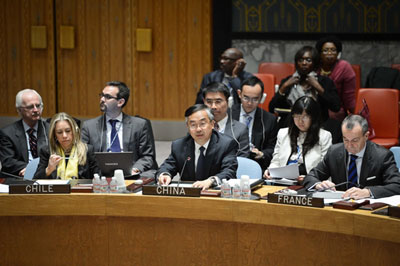| Statement by Ambassador Wang Min at the Security Council Meeting in Commemoration of the 20th Anniversary of the Genocide in Rwanda |
| 2014-04-16 04:05 |
 Madam President, The Chinese delegation thanks the Nigerian presidency for convening this meeting. I thank Deputy Secretary-General Eliasson for his briefing. I also listened attentively to Mr. Keating's statement. Twenty years ago, the people of Over the past 20 years, the international community has continued to reflect on the lessons learned from the Rwandan genocide and has spared no effort in preventing the recurrence of a similar tragedy. As the core mechanism for collective security, the Security Council has engaged actively in recent years in various actions to prevent and resolve conflicts, and played an important positive role in the maintenance of regional peace and security. Regarding ways to promptly prevent and effectively respond to various conflicts and potential crises involving new situations so as to prevent the recurrence of genocide, I wish to stress the following three points. First, preventing and containing conflicts is the most effective fundamental manner by which to prevent genocide. Ethnic and religious disputes, lack of development and weak capacities, among other factors, can potentially generate ethnic tensions, aggravate social conflicts and even lead to bloody conflict. In order to contain and eliminate the root causes of conflict, it is necessary to take integrated measures to treat symptoms and root causes alike by promoting inclusive political dialogue and national reconciliation and creating a peaceful environment that is conducive to ethnic harmony and unity. In a pluralistic society of diverse ethnicities and religions, it is all the more necessary to promote dialogue among different ethnic groups, advocate peace, harmony and inclusiveness, strengthen social cohesion, enhance understanding and trust, and prevent discrimination and confrontation. Secondly, in order to effectively prevent genocide, countries and their Governments should fulfill their duties and obligations. Governments bear the primary responsibility in protecting their civilians. Governments and parties to conflicts should all abide by international humanitarian law and the Convention on the Prevention and Punishment of the Crime of Genocide, among other international obligations, and spare no effort to protect civilians from genocide. The international community should respect the lead role of the countries concerned and, in accordance with the purposes and principles of the Charter of the United Nations, provide constructive support. Regional organizations have a deeper understanding of the situation on the ground and the root causes of conflicts and tensions. They also enjoy closer ties with the parties concerned. The United Nations and regional organizations should strengthen coordination and cooperation in order to take full advantage of synergies aimed at actively supporting the efforts of the countries concerned in the protection of civilians. The legal systems of the countries concerned should constitute the main channels for ensuring due process and justice for the victims of genocide, based on full respect for their legal traditions and genuine needs. Thirdly, the international community should prioritize assistance to the countries concerned in achieving economic growth and social progress in order to eliminate economic and social causes of conflict. The international community should use dialogue, good offices and mediation, among other tools, to promote the settlement of disputes and differences to prevent and contain the escalation of conflict and halt genocide and other crimes against humanity at the source. In parallel, the international financial institutions and development agencies should strengthen their efforts in African and other developing countries to fulfill all of their commitments in terms of assistance and debt reduction and in raising the resources necessary for The events of the past should be recalled as lessons for the future. The tragedy of Thank you, Madam President. |
| |||||||||||||
| |||||||||||||